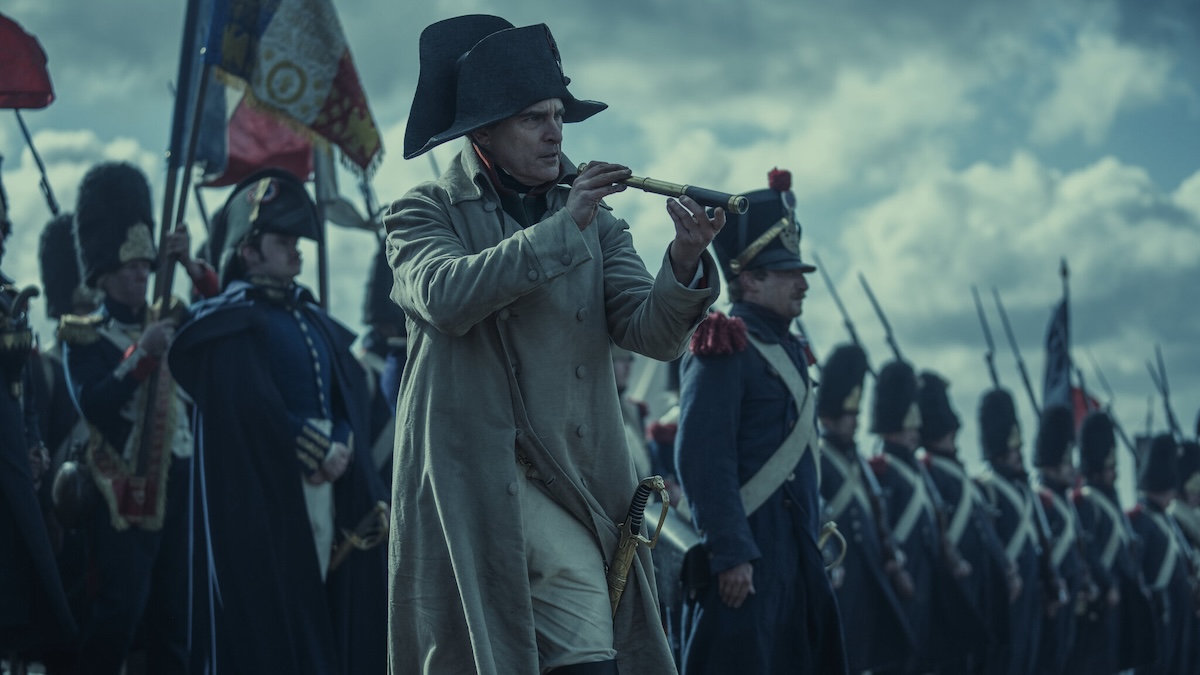Among all art forms, the movies have the greatest propensity to glorify violence, brutality, and savagery of all sorts. Because the medium is inherently kinetic, cinema captures the thrill, terror, and barbarism of battle; and because it is empathetic, cinema trains audiences to identify with and immerse themselves in the action they’re shown onscreen. It’s a potent—and sometimes dangerous—combination.
By the same token, few art forms could be said to be less effective at communicating nobility, virtue, goodness, or godliness—because such abstract values do not play to the medium’s energy and drive, and because they run afoul of its fundamentally democratic disposition.
Of course, these two ideas about the things movies do well and do poorly are broad generalizations. There are exceptions, but those exceptions consist of uniquely outstanding films: the humane among us would likely agree that Eric Rohmer’s paeans to piety are objectively superior to Quentin Tarantino’s anthems to anarchy. Yet generalizations in art tend to be confirmed not by the great works but by the lousy and lazy ones.
Such is the case of Ridley Scott’s new historical epic Napoleon, which manages to prove both of my hypotheses. As played by an indifferent, inert Joaquin Phoenix, the French general, emperor, and would-be continent conqueror comes across to any fair-minded viewer as a ruffian, scoundrel, and dangerous blunderer, his military genius notwithstanding. Yet it’s not at all clear that this is Scott’s intent. In fact, it’s not obvious that Scott holds any particular position on one of the most consequential figures in Western civilization, a leader whose greatness might be said to have been thrust upon him due to the accident of living during the French Revolution. Napoleon’s willingness to do the bidding of the revolutionaries—including his role in leading the firing on Royalists in Paris—not only led to his advancement but also fed his insatiable avarice. A coup delivered brought him an emperor’s crown, but through battles often ingenious, sometimes foolhardy, and always bloody, he was not satisfied and sought to widen his power throughout Europe.
About all this, screenwriter David Scarpa offered something of a shrug in an interview in the New Yorker: “One of the questions I found myself asking is Where am I supposed to come down on this guy?” Think about referring to Napoleon as “this guy.” And yet, while watching the film, it’s impossible to avoid getting caught up in the battles “this guy” engaged. Scott is a vastly overrated filmmaker whose technical command has long been mistaken for a large vision, but that command undeniably results here in battle scenes of rare ferociousness and impact. Among others, the Battle of Austerlitz, the trek to Moscow, even the debacle of Waterloo are filmed with intensity and impact. But since Scott and Scarpa have made a film denuded of context—the average American ticket buyer is likely to have little idea of Napoleon’s aims, purposes, or methods—we find ourselves becoming invested in the emperor’s war-making by default. Why did Britain oppose him? Why did France turn on him? Was the French Revolution even a good idea? None of this is even contemplated. All that matters are the visceral effects onscreen.
Of course, the merits or demerits of post-revolutionary France are utterly beyond the interests or intellect of these filmmakers, who open their casually violent film with Marie Antoinette being marched to the guillotine. The smug smile on the actress playing the widow of Louis XVI tells us that Scott buys into every cliché ever penned about this much misunderstood figure. Naturally, among those watching the beheading—the results of which are filmed with contemptible relish—is Napoleon, fictitiously inserted as a witness to this brutal bit of history so that Scott could film a scowling young man presumably plotting his ascent. One does not expect contemporary Hollywood filmmakers to have read, let alone to be in agreement with, Edmund Burke’s Reflections on the Revolution in France, but Scott treats the termination of the monarchy, the ascent of the revolutionaries, and the subsequent blood spilled in hugely consequential wars as though they were skirmishes between rival armies in a video game.
Scott’s indifference to the particularities of history mirrors Napoleon’s own opportunism, but that arguably promising thread goes entirely undeveloped. As any self-respecting cinephile knows, Stanley Kubrick spent untold years developing a never-made film portrait of Napoleon, and presumably Kubrick’s interpretation of the general-emperor would have brought out his obsessive qualities, however misguided or deadly they were. One can easily imagine Kubrick offering a fanatical, controlling Napoleon in the manner of, say, Jack Nicholson in The Shining. By contrast, Scott declines to pursue this interpretation because he has been saddled with a star too sleepy to suggest anything like a zealous commitment to France.
“I promised you brilliant success, and I’ve kept my word,” Napoleon says at one point, but Phoenix—who, despite his alleged versatility, always manages to suggest he is replaying his key early role as the stoned loser seduced by Nicole Kidman’s murderously inclined TV broadcaster in Gus Van Sant’s To Die For—speaks the line with such monosyllabic calmness that it barely registers. In fact, Scarpa has written the entire script in curiously simple, uninflected dialogue that often sounds strangely modern. “You think you’re so great because you have boats!” Napoleon says, but sadly the words “you think you’re so great because” could be used in numerous contexts outside the Napoleonic Wars, as in: “You think you’re so great because you made the basketball team!” or “You think you’re so great because you drive a BMW!” When Napoleon is seen hesitating at Waterloo—a mistake of catastrophic historical significance—Phoenix looks as though he’s waiting in line at the pharmacy.
Even worse, in the filmmakers’ telling, Napoleon seems to spend half his day moodily planning his takeover of Europe and the other half lustily pining for Empress Josephine (Vanessa Kirby). Like a wounded puppy, Napoleon demands that his beloved show her affection to him regularly. At one point, channeling the sort of psychobabble unknown in Napoleon’s era but ubiquitous in ours, he asks, “How could you care so little for me and my feelings?” And in a scene that may indeed prove to be enduring, at least as the raw material for internet memes, Napoleon commences a food fight with the words: “Destiny brought me this lamb chop.” For her part, Kirby has none of the regal coolness one would associate with an empress, let alone one who so bewitched her mate. We must finally acknowledge that modern movie stars are utterly incapable of plausibly incarnating aristocrats, or even arrivistes.
This depiction of Napoleon as a lovesick wimp almost makes one feel sorry for him—yet, in the end, those who know their history simply cannot go that far. The reign of Napoleon proves that Burke was right in denouncing the French Revolution and in defending the monarchy it deposed, but Scott is not interested in taking any kind of stand. It would be giving the filmmaker far too much credit to say that he has offered a pro-Enlightenment vision or mounted a defense of the Great Man view of history. To the contrary, he has offered a pro-cool battle scenes vision and mounted a defense of the Dr. Phil view of history.
At the end of the movie, a title card starkly records the astonishing number of deaths that resulted from the campaigns initiated and implemented by Napoleon, but this information is likely to confuse audiences who’ve been watching a movie that treats such battles merely as bloody pageants. Why this note of reality after all the clashing swords and booming cannons? Why this dose of sobriety on the heels of a lead performance that belongs in a skit on European history on Saturday Night Live?
This is the worst of all possible Napoleon biopics: it is neither truly horrified by what Napoleon did, nor properly awed by who Napoleon was.

